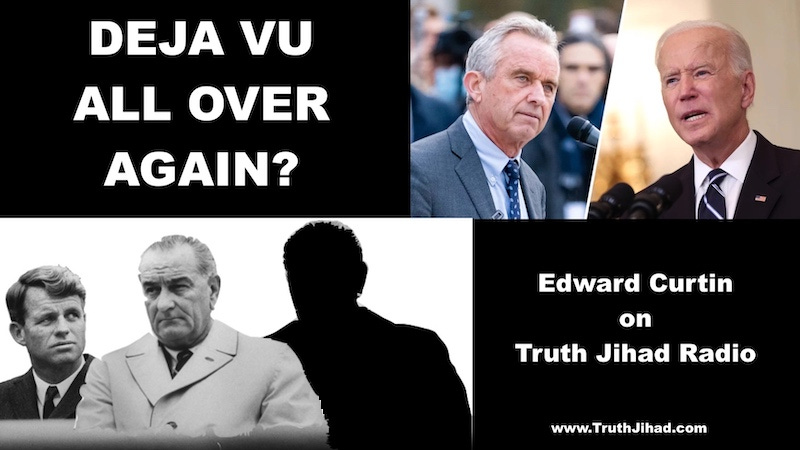Some folks have let it be known that they would rather read than listen (while others like to do both). So here is a full 7000-word transcript of Friday’s interview with Edward Curtin. -KB
Kevin Barrett: Welcome to Truth Jihad Radio. I'm Kevin Barrett, broadcasting live on Revolution Radio, the finest listener sponsored free speech network, which you can support by going to Revolution.Radio. My website is TruthJihad.com and I have a Substack, KevinBarrett.Substack.com where you can subscribe and get early access to the archives of these shows.
Tonight's show features a debate on the future of American politics. I think we all agree that the present is — well, there isn't even a word that covers it. It's gone from bad to worse to far beyond that. Is there any hope? Could it be turned around? In the second hour, Alan Sabrosky, the most censored man in America, says probably not. We'll hear it from the horse's mouth when he comes on. He's kind of given up on politics at this point. And he thinks even RFK Jr is not going to do it.
But I'm not so sure. I think there's..you just never really know. Allah can pretty much make anything happen. Stranger things have happened then an RFK Jr candidacy taking off. In the first hour Edward Curtin will discuss his new article Robert F Kennedy Jr: To Heal the Great Divide. It's an inspiring piece that's even more optimistic than my guardedly optimistic article Can RFK Jr Defeat the Media? And it's brilliant, as is pretty much everything that Ed Curtin does, and it's pretty much on the money in terms of why RFK Jr's candidacy, whether it succeeds or not, is incredibly courageous and inspiring and has that spark that you never know when it could light a fire that could burn down the bad guys. So let's talk about it. Welcome, Ed Curtin. How are you doing?
Edward Curtin: Good, Kevin. Thank you for having me.
Kevin Barrett: Great to have you back. You're right at the very top of the list of my go-to Internet writers. And your new piece, I thought, was really, well, inspiring. You got what I said pretty much the couple of weeks before that: RFK Jr's candidacy is a real, very rare bit of very good news: that a brave man has decided to put it on the line by trying to make things better in this country. And I appreciate that you really sounded that note and played it out beautifully.
Edward Curtin: Well, thank you. Yes, I think his candidacy is the first sign of hope within and beyond the electoral system that we have had in a long, long time. I think he has been addressing many of the most important issues of our time for many years. Not just what he's had to say on COVID 19 and the vaccines and all of that stuff, but on many other issues. And I think by his stepping forward, he has introduced a lot of hope into a very dreary, dark time. And I have great hope that he is going to find success. I think many people are going to be very surprised by how he garners support over the next six months. They're going to be quite startled, I believe, contrary to all the pundits who say he has no chance.
Kevin Barrett: Well, it's, of course, the media that says "he has no chance because we say he has no chance, because you will believe what we say. You will stay within the Overton window that we lay out and don't even think about stepping outside of it." They tried that with Donald Trump and it didn't work too well. But maybe they think they've learned their lesson and they can contain RFK Jr. Why do you think that they can't?
Edward Curtin: Well, I think they can't because I think contrary to Donald Trump, he is going to speak eloquently, calmly, let me use the word lovingly, across the divide. He is not going to stir the pot except to speak truth and to speak it calmly, the way he does speak. And his very brilliant mind and his command of the facts are rather extraordinary, far different from Donald Trump. And I think they're going to have a lot of trouble with him because the Democrats have no one who can counter his eloquence and his positions. So we'll see what happens. I mean, he's he's working within the Democratic Party structure right now. And they will have all the knives out to get him, the Obama and Clinton people and their neocon friends and associates who run the Democratic Party with Joseph Biden as their puppet. They're going to have a hard time containing his message because many people are sick of all the damn lies that they've been telling all these years.
And Bobby Kennedy, he's not been involved in electoral politics his entire life and he's now stepping into the fray. And he's spoken his mind, as in Boston when he opened his campaign: "I've been just saying what I think is true for years. I haven't been trying to get elected to any office. I'm not really a politician in that sense." Trump wasn't a politician either. But he had a lot of baggage. Bobby Kennedy has said, "I have a lot of skeletons in my closet, too. If they could all vote, I'd get elected right away." And the Democrats and the media will, of course, bring them out. But he's already brought them out himself. So he has little to hide and a lot to gain. And he's an eloquent voice and a very courageous guy. So I think they're going to be very, very surprised. And I think he's already surprising them. And they're going to go into a panic as the months go by.



